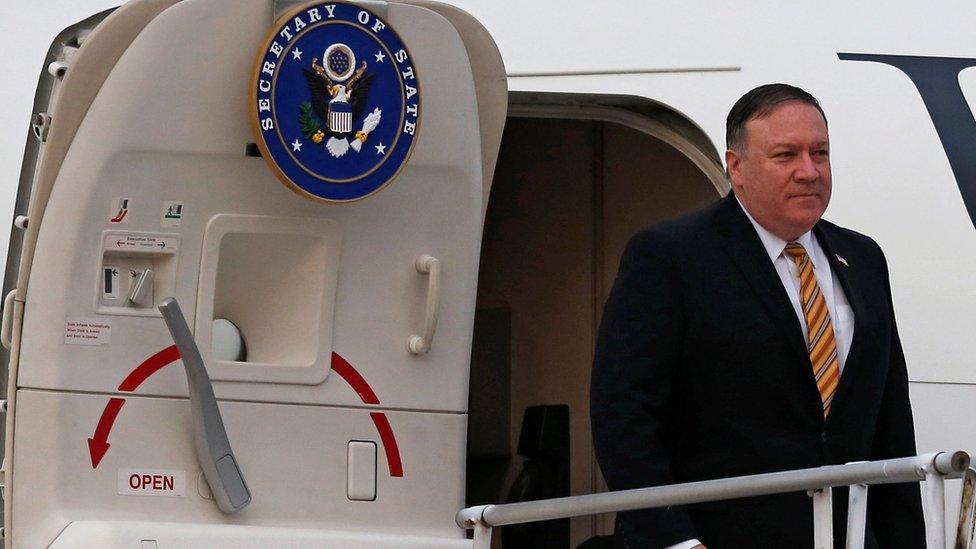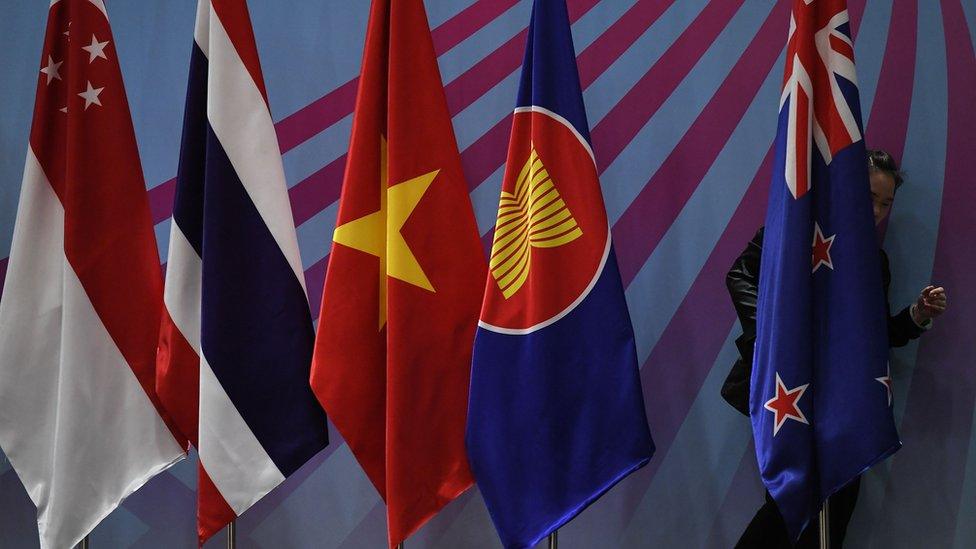Can US investment match the might of China?
- Published
- comments

US Secretary of State Mike Pompeo arrives in Kuala Lumpur on Thursday
In short, no. Certainly not when it comes to the size and scale of the investment China has across the region.
But when US Secretary of State Mike Pompeo sits down across the table from his Asian counterparts on Friday he is expected to say that America is here to stay and is committed to the region.
He will point to the speech he made earlier this week, external in which he announced $113m (£86.8m) worth of investment in the region, focused on technology, energy and infrastructure.
But his Asian colleagues cannot be blamed for looking at that amount of cash with a bit of scepticism, in comparison to what Beijing is spending under the One Belt One Road programme.
China is spending billions of dollars around the world, building roads, ports and highways. In fact, in each of the countries Mr Pompeo is visiting, China has already made significant inroads - although it is also facing some push back to what is perceived by some Asian governments as funds with strings attached.
As Joshua Kurlantzick, senior fellow for South East Asia at the Council on Foreign Relations, told me this investment is "minimal" compared to China's money in the region, and some South East Asian countries are openly saying that.
The broader issue, as he points out, is whether Mr Pompeo "can get South East Asian states to publicly state that they share some of the administration's concerns about Chinese trade practices".
Indonesia: China already invests heavily in Indonesia, and according to data from Indonesia's investment board, external is now the fourth-largest investor in the country.
However, analysts say that does not account for the funds that China invests through companies headquartered in Singapore.
The nation state is by far the largest investor in Indonesia with about $2.6bn worth of investments made in Indonesia in the first quarter of 2018 - mostly in the energy, resources and construction sectors.
Singapore: A third of China's One Belt One Road investments are in Singapore, according to government officials, external, and Singapore has long been the conduit through which Chinese firms access the rest of the region.
As an international banking centre, Singapore is also keen to position itself as a key player in facilitating Chinese currency trade flows.
Malaysia: Until recently the Malaysia-China relationship was probably amongst the best in the region. China has been Malaysia's largest trading partner since 2009 and a major foreign investor.
A number of Chinese investment projects were signed under former Prime Minister Najib Razak between the two including a $13bn east coast rail line that was abruptly suspended after the new government under Prime Minister Mahathir Mohamad came into power in May.
Now, Malaysia says it will review all of China's investments and it may be investigating whether Beijing helped to pay off some of the debt of the controversial state-run fund 1MDB.

Flags of some Asean members ahead of the summit in Singapore on Friday
Perhaps that is why Mr Pompeo has chosen Kuala Lumpur as the first stop on his South East Asian tour. What the US will say it can bring to the table - and what it will claim that China cannot - is the certainty of doing business, the rule of law and the knowledge that doing business with the US is doing business with a partner you can trust.
In his speech outlining the US's priorities in the region, Mr Pompeo could not have been more explicit about this. He didn't name China in his speech but might as well have done so.
"With American companies, citizens around the world know that what you see is what you get," he said. "Honest contracts, honest terms and no need for off-the-books mischief. Integrity in business practices is an essential pillar of our Indo-Pacific economic vision and it is what each country in the region needs."
But that may be a little hard to swallow for Asian leaders who are stuck in the middle of a US-China trade war, in which President Trump appears to have no qualms about ripping up the global multilateral trading system the international community has so painstakingly created over decades.
Mr Pompeo has his work cut out. His visit is supposed to remind Asia that the US's engagement in the region is sincere and for the long-term, and that the money it is spending here should be seen as a display of its commitment.
But China is a formidable force in these parts, and he should not underestimate that. The fortunes of South East Asia are intricately hitched to China's, so an attack on Beijing through the US-China trade war, is inevitably an attack on the economies of Asia.
And fundamentally, as one Asean official told me, it comes down to the scale of investment: "If you had to choose between $100m or $1bn, which would you choose?"